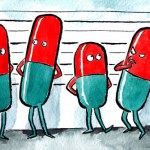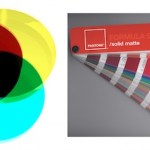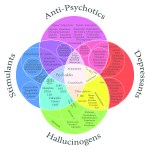Drugs
There are a number of aphorisms that one imbibes over many years of medical education, especially in medical school. Some are useful; some are not; but some stick with you for reasons that even you can't figure out. For example, I still remember my first day of medical school over 30 (!) years ago. It started with an introductory session beginning at 8 AM that lasted about an hour, an "orientation," if you will, after which classes began as normal. During this orientation, members of the medical school leadership, such as deans and the chairs of certain major departments, got a chance to…
Medical marijuana is just a backward strategy to get recreational marijuana legalised. It's like the potheads twenty years ago who would praise hemp's excellent properties as a fibre and fuel source. They didn't care about any other fibre crops. It was a transparent ruse.
A medical intervention's legality should be pushed by worldwide medical consensus, not by a regional cultural predisposition to enjoy the compound's recreational use. Medical marijuana is a non-issue in European medicine.
That said, I believe the enormous public money put into the customs, legal and punitive systems to…
"If I see a spider in my house, I put it in a cup, and then I take it outside. I save it. What is wrong with me?" -Jacqueline Emerson
There's something not only incredibly useful but also beautiful about the intricate structure of a spider web. It's such a universally admired phenomenon that it's become a metaphor for many other things, as Welbilt sings you in their song,
Spiderweb.
Dependent on the type of spider and various environmental factors, the web can take on any number of beautiful shapes.
Image credit: Darlyne Murawski, via National Geographic Society, 2007.
Image credit:…
Steven Brill's extensive piece in Time has generated a good discussion once again on why Americans pay so much more for health care than other countries, and while I agree with most of his critiques, he seems to have gotten overly hung-up on the hospital chargemaster.
Readers of this blog know I've also discussed reform in health care, the diverse sources of excess cost including price gouging on pharmaceuticals, defensive medicine, expensive end-of-life care, the high cost of primary care in the ER etc, and both Brill and I appear to have relied on the same sources of data in the McKinsey…
I'm so proud of my home state for affirming equality for all in the ballot box rather than in the courts. I was born and raised in Maryland, although I've spent more of my adult life in Virginia, one of the big things I've noticed in the divide between the two states (and I love both of them) is that Marylanders do a better job at taking care of each other, and running an effective state with high quality services. Marylanders believe government can work, and generally (outside of Baltimore) it does. Marylanders also reject bigotry, and with question 4 (the Maryland Dream act) and question…
Slate has an interesting article about Romney campaign mailings that appear to contain buzzwords for chronic Lyme disease advocates in Virginia. Romney's plan for Lyme disease includes these two points:
IMPROVE SYNERGY
Ensure that government agencies have an open line of communication and work with patients, researchers, doctors, and businesses in an objective, comprehensive manner.
SUPPORT TREATMENT
Encourage increased options for the treatment of Lyme Disease and provide local physicians with protection from lawsuits to ensure they can treat the disease with the aggressive antibiotics…
Ed Yong demands higher accountability in science journalism and has made me think of how in the last two days I've run across two examples of shoddy reporting. These two articles I think encompass a large part of the problem, the first from the NYT, represents the common failure of science reporters to be critical of correlative results. While lacking egregious factual errors, in accepting the authors' conclusions without vetting the results of the actual paper, the journalist has created a misleading article. The second, from Forbes, represents the worst kind of corporate news hackery,…
**Update, the NYT has an editorial in their Sunday edition recommending the passage of two bills in congress requiring advanced notice from drug manufacturers in event of likely shortage.
Health affairs discusses the increasingly frequent shortages of critical, life-saving, generic drugs. This is a serious problem that seems mostly limited to the U.S. healthcare system, and may adversely affect you or someone you know.
Many of the same drugs are not in such short and unpredictable supply in Europe, where in some cases they carry higher prices. This provides one major clue to the root cause…
As Chris discussed Saturday the WSJ had a silly article in which a woman demands a prescription drug from a flight attendant, asking for the wrong drug to treat her problem acutely, and then shockingly was refused this service. Worse, Nexium is mentioned by name, multiple times, and Nexium is actually a drug which should never have even been approved by the FDA. It really is only prescribed because of intense marketing because, logically, it has no business on the market and is no different than an existing drug, prilosec. Why would doctors irrationally prescribe this drug then? Because…
One thing that drove me nuts during the healthcare reform debate was the scare tactic of claiming that proposed legislation would result in rationing of healthcare. The problem with making such a claim is that healthcare is already rationed in the US. We ration healthcare based on insurance status and ability to pay. And, as a story from NPR's Richard Knox points out, we ration when there are supply shortages -- as there are now with several important drugs. Here's Knox's overview of the problem:
The shortages involve a wide range of medications: cancer chemotherapy agents, anesthetics,…
On Becoming a Domestic and Laboratory Goddess, Dr. Isis reports that drug-maker Lundbeck "will no longer provide Nembutal to prisons in states where lethal injection is legal." Nembutal is a barbiturate used in conjunction with two other drugs to execute capital offenders, and an alternative to Sodium Pentothal, which since 2010 has been in short supply. While Lundbeck may stand on merciful principles, Dr. Isis worries that Nembutal will no longer be available as a therapeutic option at U.S. prisons. On Dispatches from the Culture Wars, Ed Brayton writes that Alabama has a higher per-…
The NY Times has a story about the rise in the use of 'bath salts' as recreational drugs. Bath salts have caused some users to have hideous psychological effects, including long-term paranoia, as well as dangerous reactions (spikes in body temperature and kidney failure). What are bath salts? Well:
Bath salts contain manmade chemicals like mephedrone and methylenedioxypyrovalerone, or MDPV, also known as substituted cathinones. Both drugs are related to khat, an organic stimulant found in Arab and East African countries that is illegal in the United States.
But this bit at the end of the…
Two videos that Patrick Boyle and I made were selected for the Bio:Fiction Film Festival! One of the prizes is an online audience award, and you can watch and rate all of the films! It's such an honor to be part of this festival and to be showing our work next to that of so many amazing artists, scientists, and filmmakers, and we would be super thrilled if you voted for us!
Here are our videos! First, the world premiere of Compound 74, a fictional documentary about a possible future of synthetic drug design through synthetic biology:
And second, the commercial we made for Ginkgo BioWorks--…
It seems that there are some cool pictures/film floating around showing some of the results of the wacky shit that the military did back in the day in order to win wars in some very very unconventional ways. Here's something NPR dug up:
The Army had a few periods of experimenting with LSD and other drugs. While not secret, these tests are not as well-known as some of the similar LSD tests conducted by the CIA, such as MK-ULTRA and Operation Paperclip, where the U.S. government recruited former Nazi scientists.
This test, circa 1958, was conducted at Edgewood Arsenal in Maryland and was part…
Simply put: it's very stinky. We read with interest this post by Jon Walker about the possibility of legalization of marijuana use in Massachusetts (and the near passage in California).
While I think the pros of legalization outweigh the cons (although I have no respect for those who pretend there are no downsides), there is one serious problem related to implementation. I've lived in apartments for much of my life, and living next to a cigarette smoker is awful. In my current building, before it became smoking-free, when the smoker (and his visiting friends) fired up, my living room…
We can babble philosophically about whether or not what we call "red" looks the same from another person's eyes, we can compare the adjectives we use to specify colors--is it maraschino red or cayenne?--but when we're talking to our computers, categorizing flowers, designing objects for mass production, branding a company, or establishing a flag's official colors we have to be able to be specific about which exact shade of red we want.
These days we have standard color systems that define colors as specified mixes of red, green, and blue pixels on screen, specific mixtures of pigments in…
I stumbled across this delightful psychoactive drug Venn diagram. Isn't it pretty?
[click to enlarge]
Or more precisely, why do some patients not follow their doctors' orders even when it is blindingly obvious that they should do so? In Monday's NY Times there was an interesting article about patients who are being paid to take their medicine in a reliable manner. I was going to write about the payment issue as it raises all sorts of questions, but I've become fixated on something in the article: ignoring obvious incentives to take care of yourself.
For example, once a juvenile diabetic (someone who can't manufacture his or her own insulin) takes a lot of insulin before eating a meal,…
Turns out casual experimention with a little meth here and there is a good thing, if you're a snail. A paper recently published in the Journal of Experimental Biology explains how snails were able to remember negative stimuli longer when under the influence of a bit of speed.
When great pond snails (Lymnaea stagnalis) venture into low oxygen water, they extend a breathing tube above the water's surface. Researchers seperated a bunch of these party snails into two groups and put one sober group in normal water and another in meth-laced water. Then when the snails went to extend their…
tags: ABC Nightline Twittercast, legalization of marijuana, NORML, Allen St. Pierre, Heritage Foundation, Brian Darling, weed, pot, drugs, twittercast, streaming video
Let's kick off Silly Saturday with an interesting ABC twittercast debate about legalization of marijuana. This video is amusing because, as one person observed, it's like watching a scientist argue with a 9-year-old about the existence of Santa Claus. [Despite the moron guest on this twittercast, I find this interesting because it suggests an alternate medium for future news casts to utilize -- twitter -- and these so-called "…



